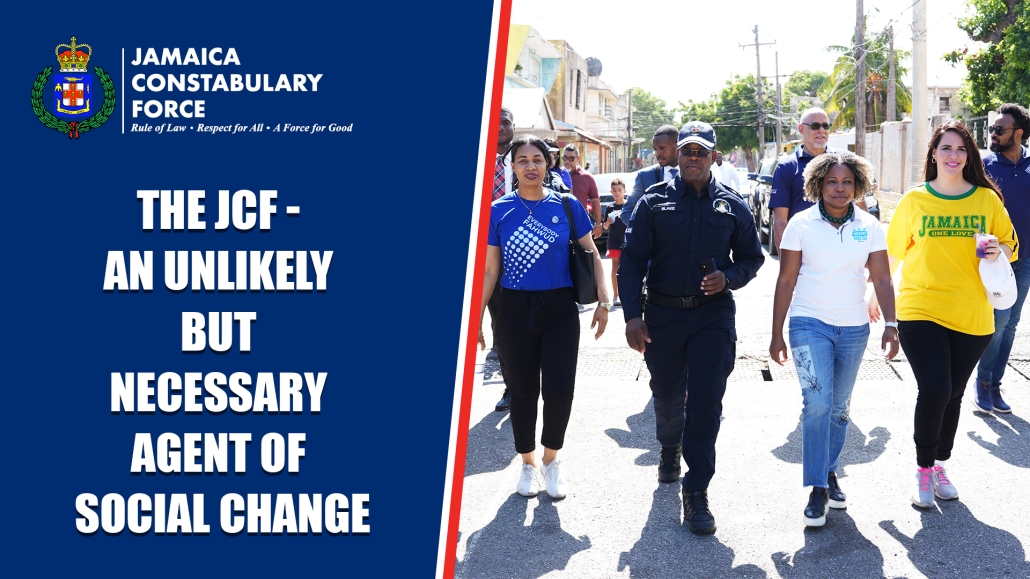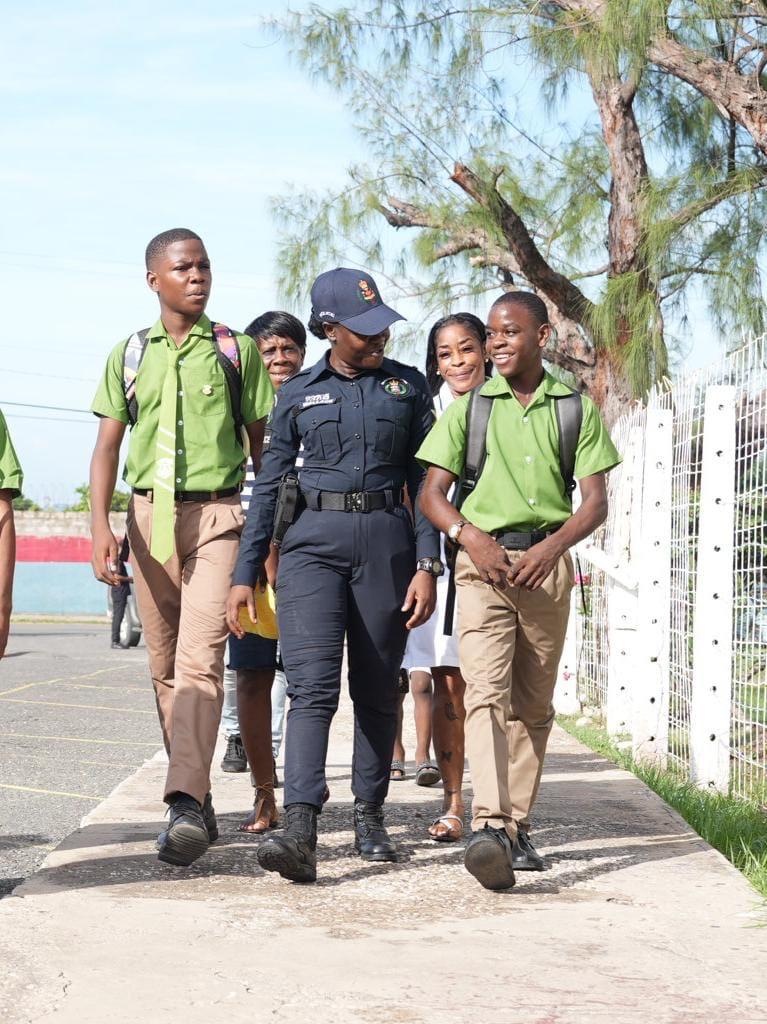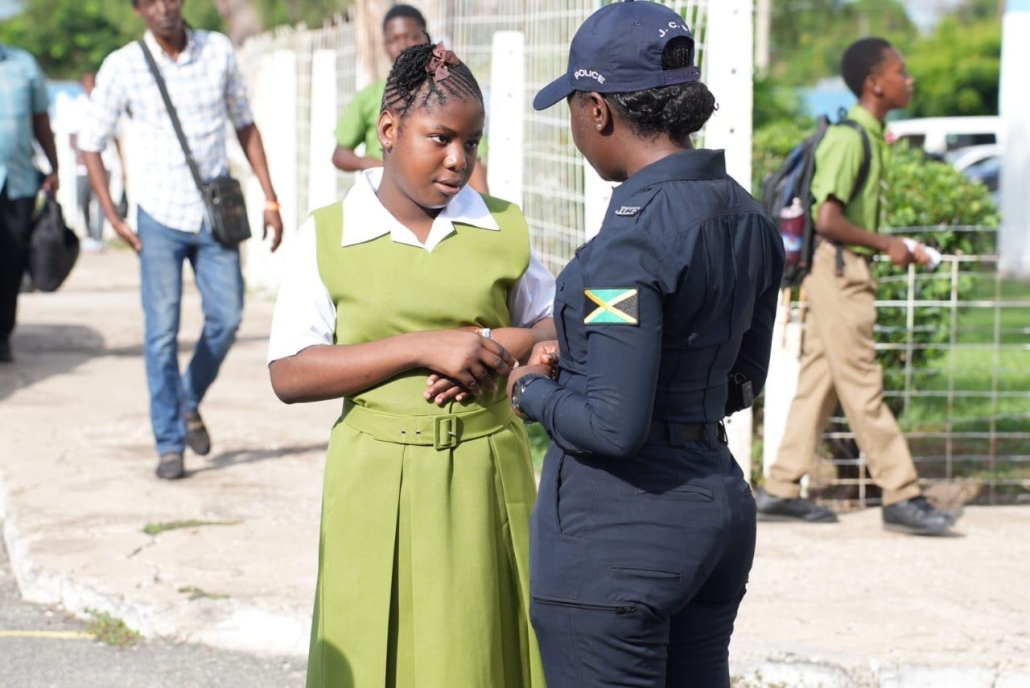
The JCF – An Unlikely but Necessary Agent of Social Change
Law enforcement agencies are often perceived solely as entities designed to maintain order, enforce the law, and protect citizens from criminal elements. Yet, in small island developing states like Jamaica, the lines between traditional law enforcement and social intervention are often blurred. The Jamaica Constabulary Force (JCF), while primarily tasked with maintaining public safety, has increasingly found itself taking on the role of an agent of social change and transformation. Commissioner Dr Kevin Blake’s latest reflections in this week’s ‘Commissioner’s Corner’ shed light on how the JCF has become more than just a law enforcement body; it has evolved into a crucial pillar of community development and social renewal.
Embracing a Broader Mandate
In many countries, law enforcement agencies are expected to focus narrowly on crime prevention, investigation, and enforcement. Yet, in Jamaica, the socio-economic realities demand a broader approach. The JCF has had to assume roles that, while technically outside its formal mandate, are indispensable to long-term crime reduction and the restoration of peace and stability in marginalized communities. As Commissioner Blake acknowledges, these efforts are not often discussed enough. “These things are not discussed enough, and we sometimes lose sight of the significance of our contribution to the social development of our nation.”
The reality is that crime does not exist in a vacuum. It is often the result of deep-seated social issues—poverty, lack of education, unemployment, and fractured family structures—that cannot be solved solely through arrests and punitive measures. Recognizing this, the JCF has embraced a proactive, multi-dimensional approach to crime fighting, focusing not only on law enforcement but also on social intervention. This approach is not just innovative—it’s essential for the unique challenges that Jamaica faces as a small island state.
Project STAR: A Beacon of Social Transformation
One of the most profound examples of the JCF’s role as a social change agent is its partnership with the Private Sector Organization of Jamaica (PSOJ) in creating Project STAR (Social Transformation and Renewal). Initially, the private sector sought ways to support the JCF in its crime-fighting efforts through traditional means such as providing equipment and resources. However, Major General Antony Anderson wisely recognized that the most effective way to support the JCF was by transforming the very communities they are tasked with policing. “Then Commissioner Anderson quite rightly suggested that the best way to help the police is to help the communities that we have to police.”
Project STAR focuses on building sustainable economic and social infrastructures within at-risk communities, ensuring that the positive changes extend beyond the lifespan of the initiative. This approach is rooted in the understanding that true social transformation must address the root causes of crime. By providing employment opportunities, fostering entrepreneurship, and creating safe spaces for young people, Project STAR aims to dismantle the conditions that often lead to criminality. “One of the key tenets of the project is the commitment that community interventions must ensure that sustainable economic activities and social infrastructure are established and remain in the communities beyond the project.”
This project is more than just a community initiative; it represents a paradigm shift in how the JCF approaches its mandate. It is an acknowledgment that public safety is deeply intertwined with social and economic development and that law enforcement can—and must—play a role in nurturing that development.
The Police Youth Club: Cultivating Tomorrow’s Leaders
For decades, the JCF has recognized the importance of engaging Jamaica’s youth as a means of both preventing crime and fostering future community leaders. The Police Youth Club (PYC), established in the 1950s, is one of the JCF’s most enduring and successful social initiatives. As Commissioner Blake highlights, “Our Police Youth Club (PYC) is one such programme that has seen significant successes in steering many at-risk youths to more positive futures.”
The PYC offers young people a structured environment in which they can develop life skills, participate in community projects, and engage in constructive activities that steer them away from criminal influences. By building trust and rapport between the police and young people, the JCF is not only preventing crime but also investing in the long-term social fabric of the communities they serve.
The success of the PYC illustrates a critical point: in communities where mistrust of law enforcement is high, proactive engagement with young people is essential. The PYC is not about policing in the traditional sense—it is about mentorship, guidance, and providing alternative pathways for Jamaica’s youth. This is the kind of work that goes beyond the remit of typical law enforcement, yet it is integral to the JCF’s mission in today’s Jamaica.
The School Resource Officer Programme: Nurturing Safe School Environments
Another key initiative that underscores the JCF’s role as an agent of social change is the School Resource Officer (SRO) programme, part of the broader Safe Schools Project. This initiative places police officers directly in schools, not only to ensure security but also to provide mentorship and guidance to students. As Commissioner Blake notes, “The SRO programme was introduced as part of the JCF’s broader Community Safety and Security Strategy.”
Schools are often microcosms of the larger society, and the issues that plague communities—violence, bullying, drug use—are mirrored within their walls. By having trained officers embedded in these environments, the JCF is taking a proactive approach to conflict resolution and crime prevention, addressing issues before they escalate. The SROs help foster a culture of peace and provide students with positive role models, offering them guidance that may be absent in other areas of their lives.
The JCF’s Role in National Development
While it is tempting to view the JCF’s role in these initiatives as supplementary to its core mission, the truth is that these social interventions are central to its effectiveness as a law enforcement agency. In a country where crime is often a symptom of broader social challenges, the JCF’s involvement in community development and youth engagement is not just a moral responsibility—it is a strategic necessity.
Law enforcement agencies are traditionally designed to react to crime. The JCF, however, is increasingly focused on prevention, recognizing that true public safety requires addressing the conditions that give rise to criminal behaviour. Whether through Project STAR, the Police Youth Club, or the SRO programme, the JCF is actively working to transform communities from within, creating environments where crime is less likely to take root.
Commissioner Blake’s reflections remind us that the JCF’s contribution to Jamaica’s social development is profound, even if it is not always recognized. “These things are not discussed enough, and we sometimes lose sight of the significance of our contribution to the social development of our nation.” The work being done by the JCF goes beyond law enforcement—it is about creating a safer, more prosperous future for all Jamaicans.
A Force for Good, A Force for Change
The Jamaica Constabulary Force, while first and foremost a law enforcement agency, has evolved into something much more. It is an agent of social change, a force for good that recognizes the importance of community development and youth engagement in the fight against crime. The initiatives led by the JCF demonstrate that when law enforcement works hand-in-hand with communities, it has the power to not only reduce crime but to transform lives.
As Jamaica continues to grapple with the challenges of crime and violence, the JCF’s role in driving social transformation will only become more critical. By embracing this broader mandate, the JCF is not only keeping communities safe—it is helping to build a better Jamaica for future generations.









